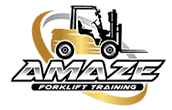
In the dynamic world of logistics and materials handling, forklifts stand as stalwart companions, streamlining operations and enhancing efficiency. However, the power and versatility of these machines demand a skilled and certified operator. Welcome to the Amaze Forklift Training blog, where we unravel the layers of expertise required in forklift operation by delving into the various types of Forklift Operator Licenses available. Join us on this educational journey as we explore the key classifications, the importance of specialized training, and the evolving landscape of forklift operation.
The Foundation: Forklift Operator License Explained
Classification Based on Forklift Types: A Tailored Approach
Class 1: Electric Motor Rider Trucks
Suited for indoor operations, these forklifts are powered by electricity and operated by riders. Commonly used in warehouses and distribution centers, operators in this class need specialized training to navigate efficiently in confined spaces.
Class 2: Electric Motor Narrow Aisle Trucks
Class 3: Electric Motor Hand Trucks or Hand/Rider Trucks
Class 4: Internal Combustion Engine Trucks (Solid/Cushion Tires)
Class 5: Internal Combustion Engine Trucks (Pneumatic Tires)
Class 6: Electric and Internal Combustion Engine Tractors
Class 7: Rough Terrain Forklift Trucks
Training Programs and Certifications: Crafting Competent Operators
Basic Operation:
Load Handling:
Safety Protocols:
Maintenance Awareness:
Renewal and Recertification: Nurturing Ongoing Competence
Forklift Operator Licenses are not perpetual; they come with an expiration date. Regular renewal is essential to ensure that operators stay updated on safety protocols, regulatory changes, and industry advancements. The renewal process often involves a refresher course, reinforcing the fundamentals and addressing any emerging challenges in forklift operation.
Recertification serves as a proactive measure to maintain a safe working environment. It not only reassures employers and regulatory bodies of an operator’s ongoing competence but also instills a sense of responsibility and accountability among operators.
Specialized Licenses for Unique Environments: Tailoring Expertise
High-Lift Reach Truck License:
Rough Terrain Forklift License:
Employer Responsibilities: Fostering a Culture of Safety
Employers play a pivotal role in shaping a safe and secure work environment. It is their responsibility to ensure that forklift operators are not only licensed but also receive continuous support for their professional development. Key responsibilities include:
- Providing access to comprehensive training programs that align with the specific forklift types used in the workplace.
- Facilitating the renewal process and offering resources for recertification to keep operators abreast of industry changes.
- Fostering a culture of safety through ongoing education, promoting adherence to safety protocols, and rewarding safe practices.
By actively participating in the professional growth of their forklift operators, employers contribute to the overall safety and efficiency of their operations.
Conclusion:
In conclusion, a Forklift Operator License is not just a legal requirement; it is a commitment to excellence, safety, and professionalism. Understanding the diverse classifications and obtaining the right license tailored to specific forklift types empower operators to navigate their unique work environments with confidence and skill.
At Amaze Forklift Training, we take pride in offering comprehensive training programs that cover a spectrum of forklift types. Our commitment extends beyond certification; we strive to shape competent operators capable of meeting the challenges of the evolving forklift landscape. Do not just operate a forklift; master it with an Amaze Forklift Operator License and elevate your skills to new heights in the world of materials handling. Join us in forging a safer and more efficient future for forklift operations.
